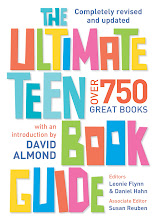 My attention was drawn to this book when it appeared on the Booktrust Teen Prize longlist. A first novel with just the kind of title that is likely to lure me in and a compelling cover image of a girl, silhouetted in white, disappearing in a forest. But would it be any good?
My attention was drawn to this book when it appeared on the Booktrust Teen Prize longlist. A first novel with just the kind of title that is likely to lure me in and a compelling cover image of a girl, silhouetted in white, disappearing in a forest. But would it be any good?The answer – yes. Helen Grant weaves a compelling tale set in the picturesque German town of Bad Munstereifel. (Now I am going to have to work out how to write an umlaut in the blog editor. Here we go: Bad Münstereifel.)
Pia, about to join secondary school, becomes fascinated and horrified by the disapparance of a young girl from the town. With her friend Stefan (whom she sometimes wishes was not her friend) she turns amateur detective, trying to find out what happened to Katharina, but taking rather a different approach from that of the police.
What transpires – particularly towards the end – is not for the faint hearted.
Bad Münstereifel almost becomes a character in the story, its folklore, its architecture, its atmosphere, all essential to the feel of the book.
After the book was finished, I was left a little bit frustrated by some issues that I felt could have been explored in more depth. But despite this, I think Katharina Linden is a really strong debut. Gripping.
Recommended by Susan Reuben
Next?
- In Kevin Brooks’s Black Rabbit Summer the main character’s best friend goes missing, and the book is partly about trying to unravel why. Or look out for Celia Rees’s The Vanished, which is also about children going missing.
- In Kate Thompson’s Creature of the Night, the folk tales of the Irish countryside are horrifyingly and realistically brought up to date.
- Or for a different twist, try Michael Grant’s Gone, in which all the adults have disappeared… or Lucy Christopher’s Stolen, which is the story of a kidnapping told by the missing girl.
- And of course, be sure to check out the rest of the Booktrust Teenage Prize 2009 longlisted titles too.



.jpg)

